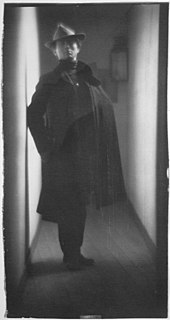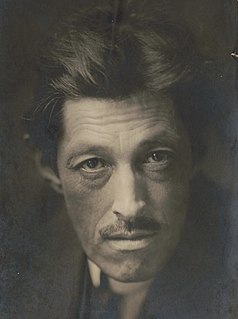A Quote by Edward Steichen
Photography is a medium of formidable contradictions. It is both ridiculously easy and almost impossibly difficult. It is easy because its technical rudiments can readily be mastered by anyonwith a few simple instructions. It is difficult because, while while the artist working in any other medium begins with a blank surface and gradually brings his conception into being, the photographer is the only imagemaker who begins with the picture completed. His emotions, his knowledge, and his native talent are brought into focus and fixed beyond recall the moment the shutter of his camera has closed.
Quote Topics
Almost
Any
Artist
Because
Begins
Being
Beyond
Blank
Both
Brings
Brought
Camera
Closed
Completed
Conception
Contradictions
Difficult
Easy
Emotions
Few
Fixed
Focus
Formidable
Gradually
His
Instructions
Knowledge
Mastered
Medium
Moment
Native
Only
Other
Photographer
Photography
Picture
Readily
Recall
Shutter
Simple
Surface
Talent
Technical
While
Working
Related Quotes
There is no art which affords less opportunity to execute expression than photography. Everything is concentrated in a few seconds, when after perhaps an hours seeking, waiting, and hesitation, the photographer sees the realization of his inward vision, and in that moment he has one advantage over most arts - his medium is swift enough to record his momentary inspiration.
Clearly the hardest thing for the working artist is to create his own conception and follow it, unafraid of the strictures it imposes, however rigid these may be... I see it as the clearest evidence of genius when an artist follows his conception, his idea, his principle, so unswervingly that he has this truth of his constantly in his control, never letting go of it even for the sake of his own enjoyment of his work.
Photography is unlike any other art form. In the other arts there is always a continuous interplay between the artist and his art. He has the painting or sculpture before him. What we have tried to do is to provide a medium for "artistic expression" to anyone with only a reasonable amount of time. By giving him a camera system with which he need only control his selection of focus, composition and lighting, we free him to select the moment and to criticize immediately what he has done. We enable him to see what else he wants to do on the basis of what he has just learned.
It has always been my belief that the true artist, like the true scientist, is a researcher using materials and techniques to dig into the truth and meaning of the world in which he himself lives; and what he creates, or better perhaps, brings back, are the objective results of his explorations. The measure of his talent--of his genius, if you will--is the richness he finds in such a life's voyage of discovery and the effectiveness with which he is able to embody it through his chosen medium.
One view of photography is that it is a zen-like act which captures reality with its pants down - so that the vital click shows the anatomy bare. In this, the photographer is invisible but essential. A computer releasing the shutter would always miss the special moment that the human sensibility can register. For this work, the photographer's instinct is his aid, his personality a hindrance.
The precision of hisskill places his work beyond the tentative and the experimental stage. He is continually searching and exploring both himself and his surroundings. and in this exploration of the realm of places, people and things, contrasts and relationships, Callahan is no respecter of conventional technical formula or code. His delicate sense of pattern is an integral part of his photography and not a thing by itself.
No man, however enslaved to his appetites, or hurried by his passions, can, while he preserves his intellects unimpaired, please himself with promoting the corruption of others. He whose merit has enlarged his influence would surely wish to exert it for the benefit of mankind. Yet such will be the effect of his reputation, while he suffers himself to indulge in any favourite fault, that they who have no hope to reach his excellence will catch at his failings, and his virtues will be cited to justify the copiers of his vices.
Man in his raw, natural state as he comes from the womb is morally and spiritually corrupt in disposition and character. Every part of his being-his mind, his will, his emotions, his affections, his conscience, his body-has been affected by sin (this is what is meant by the doctrine of total depravity)
An actor must communicate his author's given message--comedy, tragedy, serio- comedy; then comes his unique moment, as he is confronted by the looked-for, yet at times unexpected, reaction of the audience. This split second is his; he is in command of his medium; the effect vanishes into thin air; but that moment has a power all its own and, like power in any form, is stimulating and alluring.
The master in the art of living makes little distinction between his work and his play, his labor and his leisure, his mind and his body, his information and his recreation, his love and his religion. He hardly knows which is which. He simply pursues his vision of excellence at whatever he does, leaving others to decide whether he is working or playing. To him he's always doing both.
I've never heard of any one single artist being the subject in an ongoing series of radio programs for decades. Bearing this in mind, that's the kind of thing Frank Sinatra brings out in his audience, his followers. It's personally satisfying to me because his music by and large was the greatest quality of lyrics, melody, orchestration and, of course, his magnificent approach to telling a story.
She knew that it would not be easy to submit to his miserliness, or the foolishness of his premature appearance of age, or his maniacal sense of order, or his eagerness to as for everything and give nothing at all in return, but despite all this, no man was better company because no other man in the world was so in need of love.



































